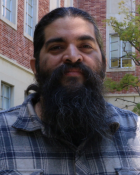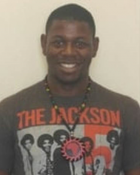
David Reyes

Olufemi Taiwo
Olufemi Taiwo is a fifth-year Ph.D. student in the UCLA Department of Philosophy. His dissertation is Autobiography. He has accepted an Assistant Professor position at Georgetown University. David Reyes ‘18 is a philosophy major and presented at UCLA Undergraduate Research Week in May 2018.
OT: What brought you to philosophy? The ideas, thinkers, people around you? What is it that you saw in this discipline?
DR: I guess the circumstances of me growing up. My parents emigrated here from Nigeria in the ‘80s, and I was growing up in conservative southwestern Ohio. So on the one hand, I knew about all these anti-black stereotypes and [had] one unrepresentative view of America from [the] pretty affluent suburb I grew up in. And then I knew that there was something up with Nigeria—it was “underdeveloped” were the terms people used—and all this next to the fact that all the Nigerian people I knew were hyper-educated, in skilled professions, or had advanced degrees. So stack any two of those up against the other one, and you get pretty confused. I guess you could say that was my first set of philosophical questions. “What’s up with all these things?” I majored in political science and economics, and the way that those fields were studied didn’t give me the answers I thought I wanted. So I thought: “Where do you get to question some of the assumptions that seem to me to be working out in problematic ways?” And that was philosophy.
OT: What is your current line of research, or what is the big research question or the big idea you focus on?
DR: I guess the big question is: “How do we be free? How can we be free?” My dissertation is about figuring out what ‘free’ means. And I ask questions that follow up on: “What does unfreedom really look like on the level of individual actions and how does it show up? ” I think it’s kind of obvious to everyone how being in prison makes you unfree, how living in a despotic regime makes you unfree. But I always thought unfreedom was a little sneaker than that. So how does living under the wrong set of social norms make you unfree? How does living under the wrong set of public information make you unfree?
There’s stuff that I’m doing parallel to some discussions in philosophy of language. You get critical philosophers, race, and feminist philosophers asking “In these kinds of conversations that men have with women here’s how we think unfreedom shows up.” But also, less obviously, “What language we use, how does that constitute a source of unfreedom, or unequal distribution of freedom?” Then the philosophers of language asking questions like “What is an assertion? How do people respond to assertions that other people have made?” Then on the epistemology side “What’s the rational way to respond to assertions?” So when you combine those three conversations, I think you get an interesting question of how our epistemic practices and how our linguistic practices and how our regular practical practices all relate to political structure and social structure.
OT: I believe you taught in prisons? And I’m curious about the idea of teaching philosophy to [the] underserved. What is it like? What is it like for you? What do you see? How does it develop?
DR: To me, teaching philosophy is a fundamentally political kind of project. At the end of the day, what philosophy means, what being a philosopher means, it’s a way of being in the world that is constitutively opposed to domination. The good idea lurking in this whole ‘everything’s about argument’ idea is that, if someone wants you to believe something, and closely related to that, someone wants you to do something, you’re owed an explanation. You’re owed a reason. I think it’s a way of fundamental mutual accountability, that’s what philosophy is about. I can’t just tell you to think the same [as me]. I have to explain to you why I think [what I do]. I have to show you what’s good about this thing, I have to convince you.
My understanding of the education system is that it’s a system that teaches some people how to comply and how to be the best compliant people, and about teaching other people how to generate the rules they should comply to. I think you have a complicated relation to that fact if you’re teaching philosophy but teaching it in places which are functionally exclusionary. And so I think one of the things we should do with this complicated situation we are in is to find opportunities to teach philosophy to people who aren’t invited to engage with the world in terms of non-domination.
OT: Can we pivot towards your activism? What is it that drives you? Other than these large questions.
DR: I think the good thing about philosophy and the way philosophy has affected how I think about this is—the idea of conviction or the idea of principle. And the idea of solidarity that you get out of those things. I’m a cis het black male. Conversations about racism, yeah I’ve got stories for that. Conversations about transphobia, little less in my personal experience, unless I’m the guilty party, right? But a little less to feel personally victimized on that side of things. And the lesson of principle is if it’s the same world that’s causing this stuff, how can I dismiss that because it doesn’t apply to me, but then ask white people to [care] when I’m talking about racism? I think that kind of reasoning everyone recognizes to some extent, but I feel it—I have an emotional relationship to that kind of reasoning that makes sense because of what I do, philosophy of principle. The argument has a claim on me because of how I articulate myself in the world that it might not have just because it’s true.
OT: How does your activism connect to your teaching, specific classes that you teach, or that you’re interested in teaching?
DR: I’d say it’s very direct because one of the things you’re constantly asking in activism is “What’s important?” “Why is it important?” and “Who is accountable for this?” I do political philosophy, and those are all political questions. So if nothing else, I’m constantly doing political philosophy in activist spaces. It’s a space where I’m learning more about what I study.
But I think that even apart from that, there’s a direct intellectual link in the sense of, one of the things that results from having a deeply unequal education system is that the space of what’s known politically or what’s understood politically is more narrow in the halls of academia than anyone’s really in a position to understand unless they do political work outside of academia.
OT: How difficult is it politically in an academic institution to really discuss your activism, specifically the political thought that drives you?
DR: I don’t think it’s as difficult as often advertised. I found that if you present things along the model of curiosity, as opposed to advocacy—I think that some activists won’t like that I put it that way because it plays into the idea of a view from nowhere that people have rightfully criticized. But the fact that maybe there’s no view from nowhere doesn’t mean the view has to be from the particular things you think because you should decenter yourself. I just don’t feel any kind of pressure or threat from presenting ideas except that they might be wrong. But usually I think things are right just because I think people thinking carefully should come to that conclusion. And if they won’t, it’s because of something that’s not my responsibility. So I think presenting things in a way that’s just saying “Here’s some interesting ideas, not let’s play with them as if they were toys, because in what I do the ideas matter, but let’s have an exploratory relationship with these ideas.”
“Teaching philosophy is a fundamentally political kind of project. Being a philosopher is a way of being in the world that is constitutively opposed to domination.”
OT: What advice do you have for incoming students who might walk into a philosophy classroom for the first time?
DR: Number one, join a union. Form a union if you don’t have one. Stay curious by any means necessary. And that’s less a suggestion about how to succeed at philosophy in a classroom or a professional sense and more that these are the conditions on which philosophy is worth doing. Be curious about something you otherwise don’t care about. Try to find the connections between things you think you don’t care about and the things you know that you already care about. Because if you were to ask year-two Femi if he would be studying semantics and would be having questions about that, he would have yelled at you. Then pounded the table and left. But here I am.



